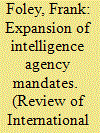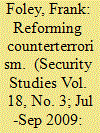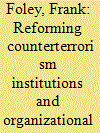| Srl | Item |
| 1 |
ID:
092466


|
|
|
|
|
| Publication |
2009.
|
| Summary/Abstract |
The UK's domestic intelligence agency, MI5, has become increasingly involved in the realm of law enforcement over the last decade. This article puts the British experience in perspective by comparing it with France's main domestic intelligence agency, which has pushed deep into the law enforcement arena in recent years. A similar perception of Islamist terrorism underpins these parallel developments in the two countries. However, differences relating to accountability, legal systems and conceptions of the state mean that the French intelligence agency has expanded its role considerably more than its British counterpart. The analysis indicates that MI5's move into law enforcement is likely to remain a relatively conservative one.
|
|
|
|
|
|
|
|
|
|
|
|
|
|
|
|
| 2 |
ID:
091789


|
|
|
|
|
| Publication |
2009.
|
| Summary/Abstract |
This article seeks to explain why two states faced with a similar terrorist threat, perceiving it in a similar way, and drawing the same broad implications for their counterterrorist investigations, have nevertheless put in place significantly different types of organizational reforms in response to that threat. The study shows that although France and Britain have embraced a common preventive logic in the face of Islamist terrorism, the changes that they have made to the coordination of intelligence, law enforcement, and prosecution in that context have differed because of contrasting organizational routines and interinstitutional conventions in the two states. An analysis of the British and French cases shows that law enforcement can be preventive but that western states are likely to pursue different ways of bringing security agencies and the law together to prevent and prosecute terrorism. The organizational and institutional factors that give rise to such divergent practices have important consequences for the ability of a state to develop a coordinated operational response to terrorism and convict terrorist suspects of crimes in a court of law.
|
|
|
|
|
|
|
|
|
|
|
|
|
|
|
|
| 3 |
ID:
091375


|
|
|
|
|
| Publication |
2009.
|
| Summary/Abstract |
This article seeks to explain why two states faced with a similar terrorist threat, perceiving it in a similar way, and drawing the same broad implications for their counterterrorist investigations, have nevertheless put in place significantly different types of organizational reforms in response to that threat. The study shows that although France and Britain have embraced a common preventive logic in the face of Islamist terrorism, the changes that they have made to the coordination of intelligence, law enforcement, and prosecution in that context have differed because of contrasting organizational routines and interinstitutional conventions in the two states. An analysis of the British and French cases shows that law enforcement can be preventive but that western states are likely to pursue different ways of bringing security agencies and the law together to prevent and prosecute terrorism. The organizational and institutional factors that give rise to such divergent practices have important consequences for the ability of a state to develop a coordinated operational response to terrorism and convict terrorist suspects of crimes in a court of law.
|
|
|
|
|
|
|
|
|
|
|
|
|
|
|
|
| 4 |
ID:
145671


|
|
|
|
|
| Summary/Abstract |
While US counterterrorism has improved in many respects since the attacks of 11 September 2001, there have still been turf battles and many cases of inadequate coordination between security agencies, which have had damaging effects on intelligence work and operations against terrorist groups. Why, more than 14 years after 9/11, do US inter-agency operations still break down in this manner? By comparing the United States with the United Kingdom, this article provides a new explanation for the deficiencies in the American response. It shows how US inter-agency conflict has negative operational consequences and draws a contrast with the British security agencies, which tend to be more closely integrated and refrain from engaging in major turf battles. I argue that the differences between the cases stem from a combination of distinct institutions and different organisational routines in the US and UK. In the United States, divided national institutions and the informal routines of its security agencies have proved problematic for joint operations and intelligence work. The article also critiques some influential existing accounts of US inter-agency counterterrorism, which emphasise bureaucratic politics or organisational culture, and shows how such perspectives can produce unrealistic policy recommendations. A focus on the deep-seated routines and institutions of the United States leads one to be more sceptical about the prospects for meaningful organisational reform.
|
|
|
|
|
|
|
|
|
|
|
|
|
|
|
|